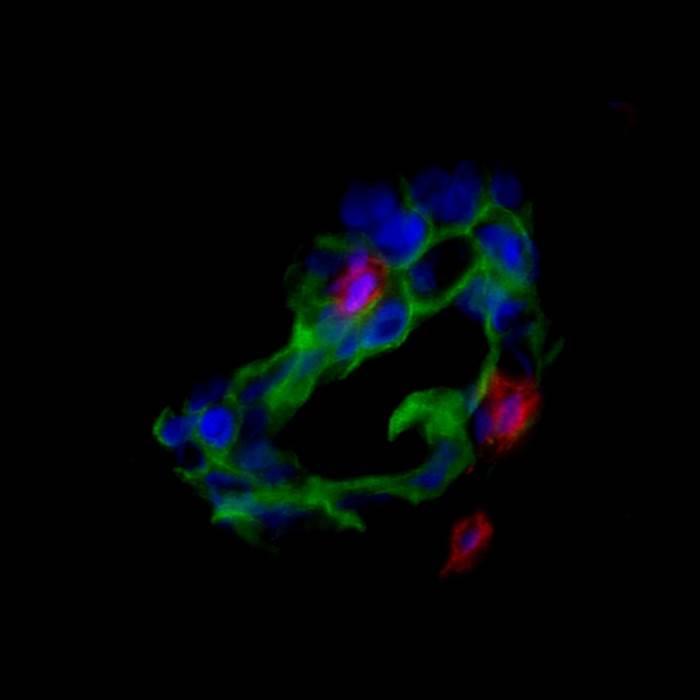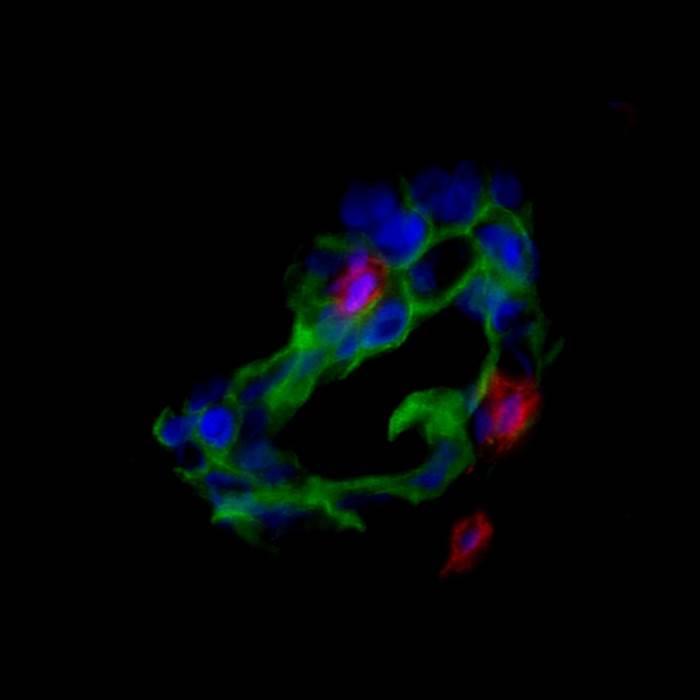
Inside each ovarian tumor, there are good cells and bad cells. A new paper explains their roles:
- The bad cells are fibroblasts. They work to block chemotherapy, which is why nearly every woman with ovarian cancer becomes resistant to treatment.
- The good cells are immune T cells. They can reverse that resistance.
These findings, reported in Cell, suggest a whole different way of thinking about chemotherapy resistance – and the potential to harness immunotherapy drugs to treat ovarian cancer.
“Ovarian cancer is often diagnosed at late stages, so chemotherapy is a key part of treatment. Most patients will respond to it at first, but everybody develops chemoresistance. And that’s when ovarian cancer becomes deadly,” says study author J. Rebecca Liu, M.D., associate professor of obstetrics and gynecology at the University of Michigan.
“In the past, we’ve thought the resistance was caused by genetic changes in tumor cells. But we found that’s not the whole story,” she says.
Researchers looked at tissue samples from ovarian cancer patients. They separated the cells by type to study the tumor microenvironment in cells and in mice. They also linked their findings back to actual patient outcomes.
Ovarian cancer is typically treated with cisplatin, a platinum-based chemotherapy. The researchers found that fibroblasts blocked platinum. These cells prevented platinum from accumulating in the tumor and protected tumor cells from being killed off by cisplatin.
Immune T cells, on the other hand, overruled the protection of the fibroblasts. When researchers added the immune T cells to the fibroblasts, the tumor cells began to die off.
“T cells are the soldiers of the immune system. We already know that if you have a lot of T cells in a tumor, you have better outcomes. Now we see that the immune system can also impact chemotherapy resistance,” says study author Weiping Zou, M.D., Ph.D., Charles B. de Nancrede Professor of Surgery, Immunology and Biology at the University of Michigan.
By boosting the immune T cells, the researchers were able to overcome the chemotherapy resistance in mouse models. They used interferon, a type of small protein, to manipulate the pathways involved in cisplatin.
The researchers suggest that combining chemotherapy with immunotherapy may be effective against ovarian cancer. PD-L1 and PD-1 pathway blockers are FDA-approved treatments in some cancers, although not ovarian cancer.
“We can imagine re-educating the fibroblasts and tumor cells with immune T cells after chemoresistance develops,” Zou says.
“Then we could potentially go back to the same chemotherapy drug that we thought the patient was resistant to. Only now we have reversed that and it’s effective again,” Liu adds.
###
This approach requires additional clinical testing and is not currently available to patients. Patients seeking information about current ovarian cancer treatments can call the U-M Cancer AnswerLine at 800-865-1125.
Funding: U.S. Department of Defense; National Institutes of Health grants CA123088, CA099985, CA156685, CA171306, CA190176, CA193136, 5P30 CA46592, U24 DK097153; Ovarian Cancer Research Fund, Marsha Rivkin Center for Ovarian Cancer Research, Barbara and Don Leclair
Media Contact
Nicole Fawcett
[email protected]
734-764-2220
@UMHealthSystem
http://www.med.umich.edu
The post Immune cells help reverse chemotherapy resistance in ovarian cancer appeared first on Scienmag.





